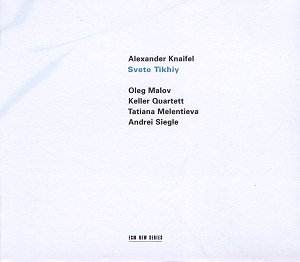
In Air Clear and Unseen (1994)a
Svete Tikhiy (1991)b
Recorded: Radio Studio DRS Zürich, October 2000 (In Air Clear and Unseen) and Film Studio Lenfilm, 1994/5 and
BUY NOW
 |
Alexander KNAIFEL (born 1943)
In Air Clear and Unseen (1994)a Svete Tikhiy (1991)b Recorded: Radio Studio DRS Zürich, October 2000 (In Air Clear and Unseen) and Film Studio Lenfilm, 1994/5 and |
Error processing SSI file |
|
|
||
|
Knaifel once described some of his recent works as “quiet giants”. Most of his output is quite unusual in terms of instrumental or vocal forces as well as in terms of length. The two pieces recorded here are fairly recent; and, even if they may not be described as “giants” (they play for about twenty minutes), they are both substantial and “quiet”. The piano quintet In Air Clear and Unseen, completed in 1994, is inspired by verses of Fyodor Tyutchev and might, to a certain extent, be described as ‘songs without words’ sung mezza voce, as if to oneself. The first movement In some exhausted reverie is a long piece for piano often verging on silence (isolated notes interspersed by long pauses or the other way round, if you prefer) out of which a slow chorale hesitantly emerges. The second movement An Autumn Evening, for string quartet alone, is equally dreamlike and mysterious, but more overtly melodic (hints of the ‘Baltic Monks’ here). All five players join in the final movement In Air Clear and Unseen, another sorrowful song. “Your image ... lives in me still. I think of it with endless yearning/ ‘Tis e’er with me though from me far/Unreachable, unchanged, bright-burning/As in the sky of night a star...” (Tyutchev). Knaifel’s slow-moving, expressively subdued and rarefied music clearly reflects Tyutchev’s words in An Autumn Evening : “There is a wistful charm, a tenderness, mysterious and soft...”. The music’s deliberate restraint, however, is not without charm and emotion; but it only yields its secrets on repeated hearings, when one has adjusted to its slow moving pace. Svete Tikhiy (“O Gladsome Light”), dedicated to Kancheli, is another ‘quiet giant’ for voice and sampler. It uses Tatiana Melentieva’s voice in many imaginative ways. The use of sampling creates some unexpected counterpoint. This overtly religious work, for the most part an elaborate and often moving setting of The Song of the Most Holy Theotokos (i.e. the Magnificat), may be experienced as a sacred ritual. It opens with a short prelude Ringing of Church Bells (actually a “setting” of Hail Mary) leading into the Magnificat in which Melentieva’s voice is handled in many ways, either alone or artificially duplicated to provide some ostinato chanting supporting the solo voice, thus creating a fascinating echo-effect. The last section is a subdued and awe-stricken setting of the hymn O Gladsome Light. The global impact of the piece is hypnotic, fascinating, gripping or frankly boring depending on one’s frame of mind; but, in no way, indifferent. This superbly produced release provides for a fascinating glimpse into Knaifel’s idiosyncratic sound world and musical thinking. It all depends on how one is likely to react to it and on how one responds to this particular brand of Holy Minimalism. Well worth investigating though. Hubert Culot |
|
Return to Index |